Wisdom of the East
ebook ∣ Buddhist Psalms Translated from the Japanese of Shinran Shonin
By Shinran Shonin

Sign up to save your library
With an OverDrive account, you can save your favorite libraries for at-a-glance information about availability. Find out more about OverDrive accounts.
Find this title in Libby, the library reading app by OverDrive.



Search for a digital library with this title
Title found at these libraries:
| Loading... |
Buddhism passed into Japan from China and Korea about 1320 years ago, in or about the year A.D. 552. It adapted itself with perfect comprehension to the ideals of the Japanese people, inculcating among them the teachings of morality common to the great faiths with, in addition, the spiritual unction, the passion of love and sympathy, self-devotion, and compassion, in which Buddhism and Christianity are alike pre-eminent. The negative side of Buddhism, with its passionless calm and self-renunciation, is the only one that has been realised in the West, and the teachings of Mahayana which have borne fruit and flower, visible to all the world, of happiness, courtesy, kindliness in the spiritual attitude of a whole people, have never received the honour which was their due.
For with the Buddhist faith there came the germ of the belief that the Gautama Buddha in his own grandeur bore witness to One Greater - the Amitabha or Amida Buddha - that One who in boundless light abideth, life of the Universe, without colour, without form, the Lover of man, his Protector and Refuge. He may, He must be worshipped, for in Him are all the essential attributes of Deity, and He, the Saviour of mankind, has prepared a pure land of peace for his servants, beyond the storms of life and death. This belief eventually crystallised and became a dogma in the faith of the Pure Land, known in Japan as Jodo Shinshu, a faith held by the majority of the Japanese people. It is a Belief which has spread also in Eastern Siberia, many parts of China, Hawaii, and, in fact, whereever the Japanese race has spread. And the man who stated this belief for all time was Shinran Shonin, author of the Psalms here presented.
He was born in the year A.D. 1175 near City-Royal - Kyoto, the ancient capital of Japan. He was a son of one of the noblest families, in close connection with the Imperial House, and had it not been for the passion for truth and the life of the spirit which consumed him, his history would have been that of the many other brilliant young men who sank into mere courtiers - "Dwellers above the Clouds," as the royalties and courtiers of the day were called among the people. But the clear air above the clouds in which his spirit spread its wings was not that of City-Royal, and the Way opened before him as it has opened before many a saint of the Christian Church, for while still a child he lost both his parents, and so, meditating on the impermanence of mortal life, and seeing how the fashion of this world passes away, he abandoned his title and became a monk in one of the noble monasteries whose successors still stand glorious among the pine woods above Lake Biwa.
These were not only monasteries, but seats of learning, as in Europe in the Middle Ages, and here the Doctrines were subjected to brilliant analysis and logical subtleties which had almost superseded the living faith. In that cold atmosphere the spirit of Shiran Shonin could not spread its wings, though for twenty years he gave his thoughts to its empty glitter. Therefore, at the age of twenty-nine he cast it all behind him, and in deep humility cast himself at the feet of the great Teacher Honen, who, in the shades of Higashiyama, was setting forth the saving power of the Eternal One who abideth in the Light and in whom is no darkness - the Buddha of Boundless Light. And in this place and from this man Shinran received enlightenment.






